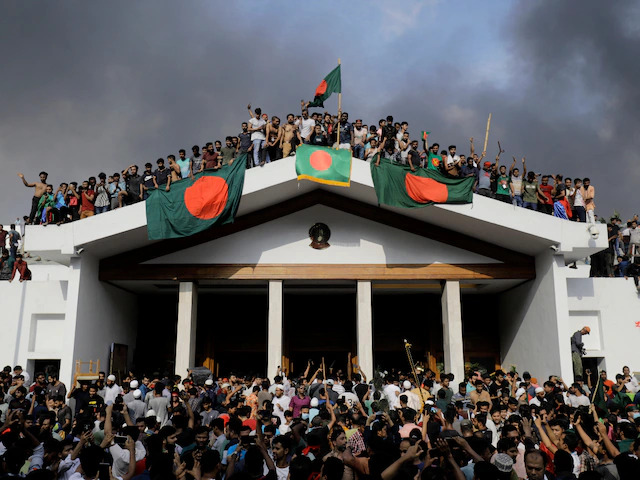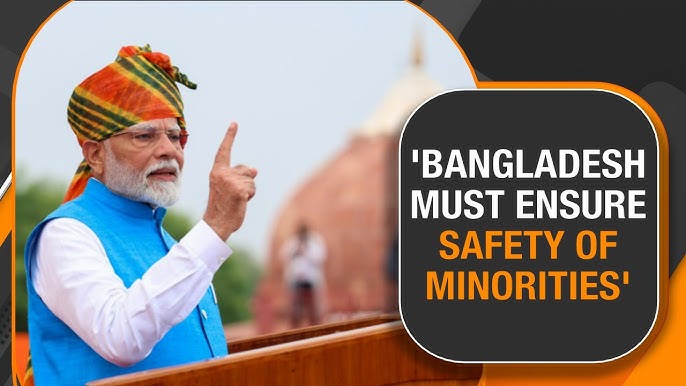
PM Modi’s Response to Hindu Attacks in Bangladesh
Introduction
In recent weeks, the situation in Bangladesh has become increasingly dire as a series of violent attacks against the Hindu minority have raised alarms both within the country and internationally. PM Modi’s response to Hindu attacks in Bangladesh has drawn significant attention as India closely monitors the situation. These incidents have involved targeted assaults on Hindu temples, homes, and businesses, leading to widespread fear and insecurity among the Hindu community in Bangladesh. The Hindu minority, which constitutes a small percentage of the population, has historically faced challenges, but the recent surge in violence marks a particularly troubling escalation.
Given the close cultural, historical, and religious ties between India and Bangladesh, these events have not gone unnoticed by India, where there is significant concern for the safety and well-being of Hindus in Bangladesh. On August 10, 2024, Indian Prime Minister Narendra Modi took a decisive stance on the issue, addressing the attacks and outlining India’s response. PM Modi’s actions have been seen as a crucial step in not only protecting the Hindu minority in Bangladesh but also in maintaining regional stability and upholding the principles of human rights.
The Attacks on Hindus in Bangladesh

The recent attacks on Hindus in Bangladesh !have been both brutal and systematic, targeting individuals, communities, and religious institutions. Reports indicate that several Hindu temples were vandalized, with idols destroyed and sacred sites desecrated. In addition, there have been numerous instances of homes and businesses belonging to Hindus being looted and burned. These attacks have created an atmosphere of fear and uncertainty within the Hindu community, forcing many to flee their homes and seek refuge in safer areas.
This wave of violence is part of a broader pattern of religious intolerance that has been simmering in Bangladesh for some time. The Hindu community, which makes up around 8–10% of the population, has long faced discrimination and occasional violence. However, the recent surge in attacks is particularly concerning, as it suggests a growing boldness among perpetrators and a possible breakdown in law and order.
The reasons behind these attacks are complex and multifaceted. They are often linked to broader political and social tensions within Bangladesh, including rising religious extremism, political instability, and economic challenges. Certain groups that seek to gain political leverage from religious disparities appear to have orchestrated these attacks. The impact on the Hindu community has been devastating, with many fearing for their lives and their future in Bangladesh.
PM Modi’s Response and Actions
In response to these alarming developments, Prime Minister Narendra Modi took swift and decisive action. On August 10, 2024, PM Modi delivered a strong statement condemning the attacks on Hindus in Bangladesh and expressing India’s deep concern over the situation. He emphasized that India would not stand by while religious minorities in neighboring countries are persecuted and stressed the importance of protecting human rights and religious freedom.
PM Modi’s response included a multifaceted approach aimed at addressing the situation both diplomatically and practically. Firstly, India’s diplomatic channels were activated, with the Indian government summoning the Bangladeshi High Commissioner to New Delhi to express its concerns and seek assurances that the Bangladeshi government would take immediate action to protect the Hindu community. This move was seen as a clear signal to Bangladesh that India expects concrete measures to be taken to prevent further violence.
In addition to diplomatic efforts, PM Modi also called for increased security measures along the India-Bangladesh border to prevent any potential spillover of violence into India. The Indian government has offered assistance to Bangladesh in maintaining law and order and has proposed joint efforts to combat religious extremism in the region. This includes intelligence sharing and cooperation between law enforcement agencies to track and dismantle networks involved in orchestrating such attacks.
Furthermore, PM Modi announced that India would extend support to the Hindu community in Bangladesh through various means, including humanitarian aid, legal assistance, and asylum options for those seeking refuge. The Indian government has also called on international organizations and human rights groups to closely monitor the situation in Bangladesh and to hold those responsible for the violence accountable.
Policy Decisions and Support Measures
As part of his response, PM Modi has outlined several key policy decisions aimed at providing immediate and long-term support to the Hindu community in Bangladesh. One of the most significant measures is the establishment of a special fund dedicated to supporting victims of religious violence in Bangladesh. This fund will be used to provide financial assistance to those who have lost their homes, businesses, or loved ones in the attacks, as well as to support the rebuilding of temples and other religious sites that have been damaged.
In addition to financial aid, India has also offered to provide legal assistance to Hindus in Bangladesh who are facing persecution. This includes helping victims file complaints and pursue justice in cases where local authorities have been slow or unwilling to act. India’s legal support initiative is designed to empower the Hindu community in Bangladesh and ensure that their rights are protected under the law.
PM Modi has also emphasized the need for a long-term strategy to address the underlying causes of religious violence in Bangladesh. This includes strengthening India’s engagement with Bangladesh on issues related to religious tolerance and human rights. As part of this strategy, India has proposed the creation of a bilateral task force that would focus on promoting religious harmony and preventing violence against minorities. The task force would be composed of representatives from both countries and would work to identify and address the root causes of religious tensions.
Reactions and Implications

PM Modi’s response to the situation in Bangladesh has elicited a wide range of reactions, both within India and internationally. Within India, there has been strong support for PM Modi’s stance, particularly among Hindu organizations and political leaders who have praised his commitment to protecting the Hindu community in Bangladesh. Many see his actions as a necessary step in ensuring the safety and dignity of Hindus in the region.
However, PM Modi’s response has also sparked debate over the implications for India-Bangladesh relations. While some argue that India’s intervention is justified given the severity of the situation, others caution that it could strain diplomatic ties between the two countries. Bangladesh’s government has responded cautiously, acknowledging the concerns raised by India but also emphasizing the importance of respecting Bangladesh’s sovereignty and internal affairs.
Human rights organizations and other nations have been keenly observing PM Modi’s moves internationally. Many have expressed support for India’s efforts to protect religious minorities, while others have urged restraint and called for a more measured approach. The situation has also drawn attention to the broader issue of religious violence in South Asia and the need for regional cooperation to address it.
Implications for India-Bangladesh Relations
The recent events and PM Modi’s response have significant implications for India-Bangladesh relations. Historically, the two countries have enjoyed a close and cooperative relationship, with strong cultural, economic, and political ties. However, the current situation presents a challenge to this relationship, as India’s intervention in Bangladesh’s internal affairs could be seen as overreach.
That said, PM Modi’s actions could also lead to positive outcomes if handled carefully. By addressing the issue of religious violence in Bangladesh, India has the opportunity to reinforce its role as a regional leader and advocate for human rights. This could lead to stronger bilateral cooperation on issues such as counterterrorism, border security, and economic development.
Moreover, PM Modi’s response could serve as a catalyst for broader regional efforts to address religious intolerance and violence in South Asia. By working together, India and Bangladesh, along with other countries in the region, could develop a coordinated approach to promoting religious harmony and protecting the rights of minorities. This would not only help to prevent future violence but also contribute to long-term peace and stability in the region.
Conclusion
The recent attacks on Hindus in Bangladesh and PM Modi’s response to Hindu attacks in Bangladesh have brought to the forefront the challenges facing religious minorities in South Asia. The situation highlights the need for strong leadership, both at the national and regional levels, to protect the rights and safety of all communities. PM Modi’s response, while bold, reflects India’s commitment to upholding these principles and supporting its neighbors in times of crisis.
As the situation in Bangladesh continues to evolve, it will be important for both India and Bangladesh to work together to address the root causes of religious violence and to promote a culture of tolerance and respect. The path forward will require careful diplomacy, sustained engagement, and a shared commitment to peace and stability in the region. Ultimately, the goal must be to create a future where all people, regardless of their religion or ethnicity, can live in safety and dignity.
For Further information, click here: studybycurrentnews.com